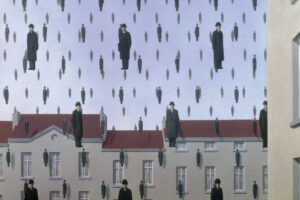Sometimes I like to read a popular book, a book that everyone is reading—so that I can know what everybody is talking about and, maybe, join in the conversation. So a couple weeks ago I read The Fault in Our Stars—the latest young adult novel from author John Green. The book—about two teenagers who meet at a cancer support group—is instantly gripping, and continues on to tell–in quick-witted, excellently crafted prose—a heart-wrenching, beautiful, soul-searching story that turned my insides upside down. Lest you think this book is the rewrite of a cheesy Nicholas Sparks novel, I can assure you it’s not. While wrestling with questions about suffering, and purpose, life after death and the meaning of life, the book still manages to escape even one run-in with sentimentality.
Of course, I read it all in one night, and cried so much my eyes were practically swollen shut the next day. Ultimately, it left me cold—utterly cold, and empty—and not really because it deals with death. (I don’t think saying that spoils anything, since what do you expect from a book whose plot revolves around young love and cancer?) While the story expertly wrangles with the heaviest of our human questions, it ends with—what I find to be—the typical postmodern emptiness. A conclusion somewhat along the lines of, (my paraphrase) “We have all these questions, and will we ever find answers to them? Most likely not, but in the midst of all my existential quandaries, I assert that my life matters. Because it happened. Because I experienced it. And I cling on to that in the face of all the vastness of the universe and in the face of my own insignificance: I existed.” The emptiness of the book is not the emptiness of death, but the emptiness of worldview.
Granted—the book stars two unforgettable characters, and is filled with funny, tender, and thoroughly realistic scenes and interactions that all work together to tell a powerful story. I would argue that where the book fails is in developing a framework in which to live and think, and eventually, die. The characters exist in a world without a narrative, without a story that informs their place in the cosmos. Instead, they live in this great gaping universe in which they feel significant but know that they truly are of no consequence, and that all their efforts to matter are really of no account. They are adrift in the universe at large.
I didn’t want the book to preach Christianity, or monotheism to me, or to tell me what happens after I die. I just wanted something solid to stand on—some kind of a framework or worldview or meta-narrative in which to exist aside from the great void of nothingness.
And once I finished the book, I wanted to be reminded of my place in the universe. I wanted to ground myself again in the story—the great Narrative—that tells me who I am and where I come from and where I am going: the story that informs and surrounds and upholds my life. I needed to re-center myself in truth and meaning. So I read 1 Corinthians 15, and sank with relief into the words of the Nicene Creed, and whispered aloud the mystery of faith, “Christ has died, Christ has risen, Christ will come again.” And I found myself so grateful for the Gospel as story—the Gospel that creates the world around us, and places us in the midst of a story with meaning, and beauty, and truth.
But back to The Fault in Our Stars—I was ready to wish I hadn’t read the book, when I had a discussion about it with my friend Michelle. I was complaining about the stark emptiness in which it left me, and the authority with which it froze my blood, and she said (something to the effect), “It takes a great book to do that.” And I stopped. She was right. I could admit that I didn’t like the conclusions the book came to, but I could not dismiss a book that came at me with such force and moved me with such power. Books like that have to be noticed, need to be read, and must then be questioned, and talked back to. They need to be pushed and prodded and held up to the light and felt in the darkness. There is worth in a book that can make you feel lost and perhaps even value in a book that answers no questions. It can be the impetus to search for meaning, to hunt for answers, to be found.





2 Comments
Leave your reply.